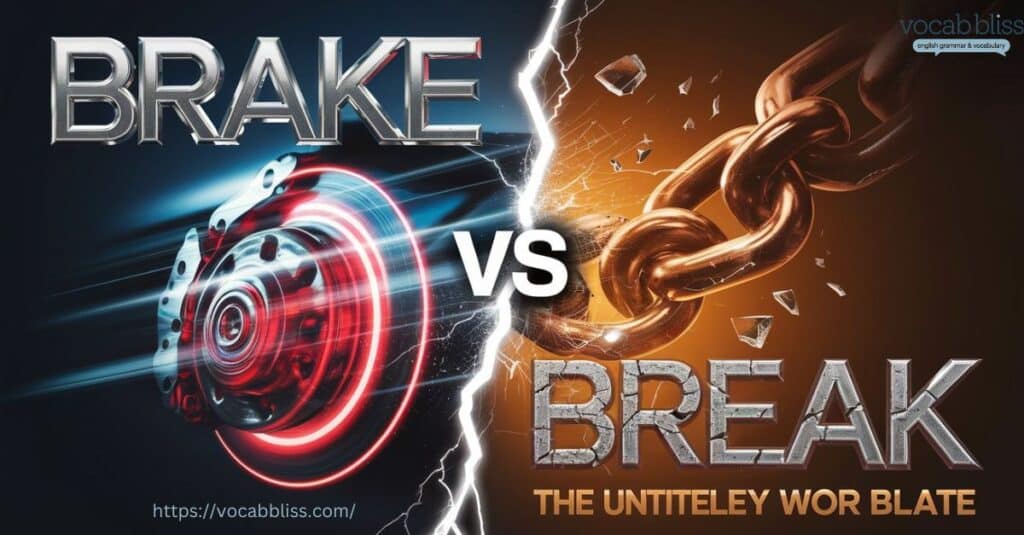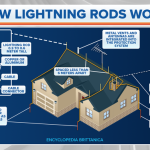Language can be tricky, especially when two words sound exactly the same but mean entirely different things. Such is the case with “Brake vs Break” These homophones can confuse even the most seasoned writers and speakers.
So, how do you know which one to use? This comprehensive guide will clear up any confusion and provide practical tips to master their usage. Let’s dive into the fascinating world of brakes vs breaks, their meanings, and when to use them.
Quick Summary
In summary, “brake” refers to the mechanical device used to slow or stop motion, often found in vehicles and machinery, and can also describe the action of slowing down. On the other hand, “break” is used when referring to separation, damage, or interruptions, such as breaking an object or taking a pause. To remember the difference, associate “brake” with vehicles and movement control, while “break” refers to rest, damage, or interruptions. Additionally, by understanding these distinctions and keeping a few mnemonic tricks in mind, you’ll confidently use both words correctly in everyday language. This simple strategy will ensure you avoid confusion and enhance your communication skills..
Find more: Miner vs Minor: Understanding the Difference
Understanding Brake vs Break
Let’s explore the differences between these two commonly confused words by first diving into their definitions. Then, we’ll examine their roles and, finally, how they’re used in everyday language.
Break: Definition and Usage
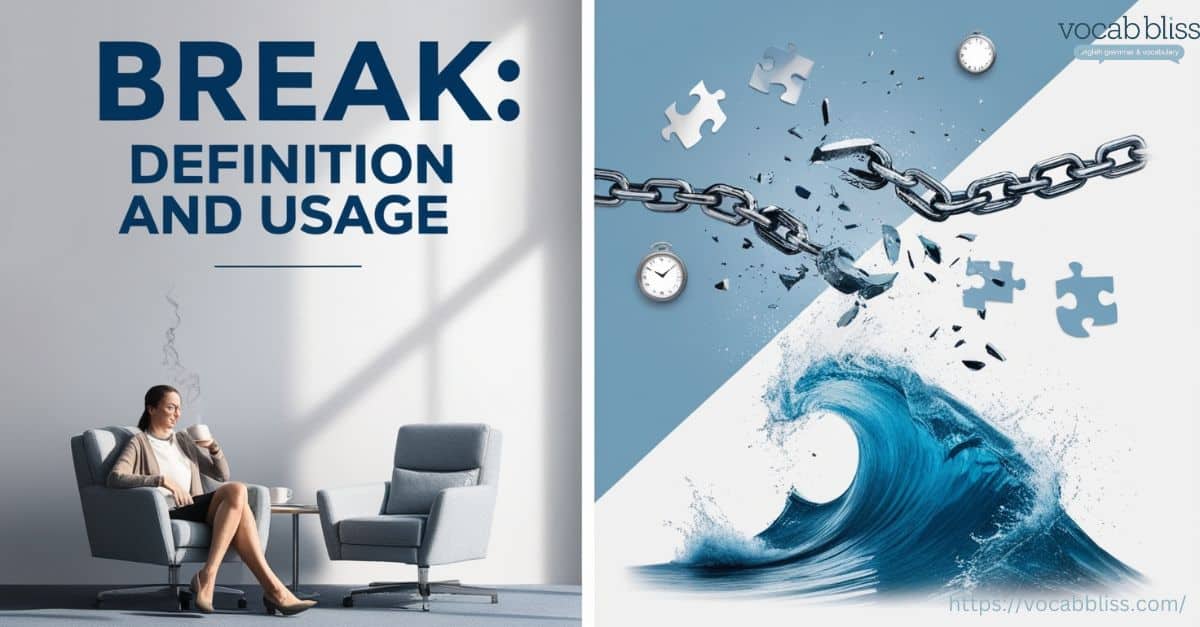
The word “break” is versatile and can be used as both a verb and a noun. At its core, it refers to separating, interrupting, or damaging something. For example, here are some primary meanings:
- To separate into parts or pieces:
- Example: He accidentally broke the glass while cleaning.
- To interrupt or stop something temporarily:
- Example: Let’s take a short break before continuing the project.
- To weaken or destroy something:
- Example: The news broke her spirit.
- To exceed a limit or record:
- Example: The athlete broke the world record in the 100-meter race.
As a noun, “break” often refers to a pause or interruption.
- Example: We’ll take a coffee break at 10 a.m.
Which One Is the Break?
The word “break” is used when referring to interruptions, damage, or pauses in various contexts. You can easily identify it by considering whether the situation involves:
- A temporary stop or rest: I need a break from work.
- Something being damaged or separated: The chair leg broke under pressure.
- A figurative or literal interruption: The conversation broke when the phone rang.
Quick Tip to Identify Break
If the context involves shattering, pausing, or interrupting, “break” is likely the correct choice.
Past Participle of Break
what is the past participle of break is broken. It is used in perfect tenses or as an adjective. Examples:
- Perfect Tense:
- He has broken his promise several times.
- The window was broken by a stray ball.
- Adjective Usage:
- The broken vase lay in pieces on the floor.
Past Tense of Break
Break past tense is broke. It refers to an action completed in the past. Examples:
- She broke her phone yesterday.
- The kids broke the rules during recess.
Key Difference Between Broke and Broken
- Broke: Simple past tense (e.g., I broke the plate.)
- Broken: Past participle or adjective (e.g., The plate was broken by the fall.)
How Do You Use the Word Break in a Sentence?
Understanding how to correctly use “break” can help prevent common errors. For instance, here are some examples across different contexts:
- Physical Damage:
- He broke the handle of the suitcase.
- The toy broke after it fell off the table.
- Taking a Pause:
- Let’s take a lunch break at noon.
- She enjoys a coffee break in the morning.
- Exceeding Limits:
- The runner broke the record for the 5k race.
- They broke the sales target this quarter.
- Interrupting Continuity:
- The silence was broken by the sound of thunder.
- The internet connection broke during the storm.
Idiomatic Usage of Break
- Break the ice: To initiate conversation or ease tension in a group.
- Break a habit: To stop doing something habitual.
- Break the bank: To spend an excessive amount of money.
Brake: Definition and Usage
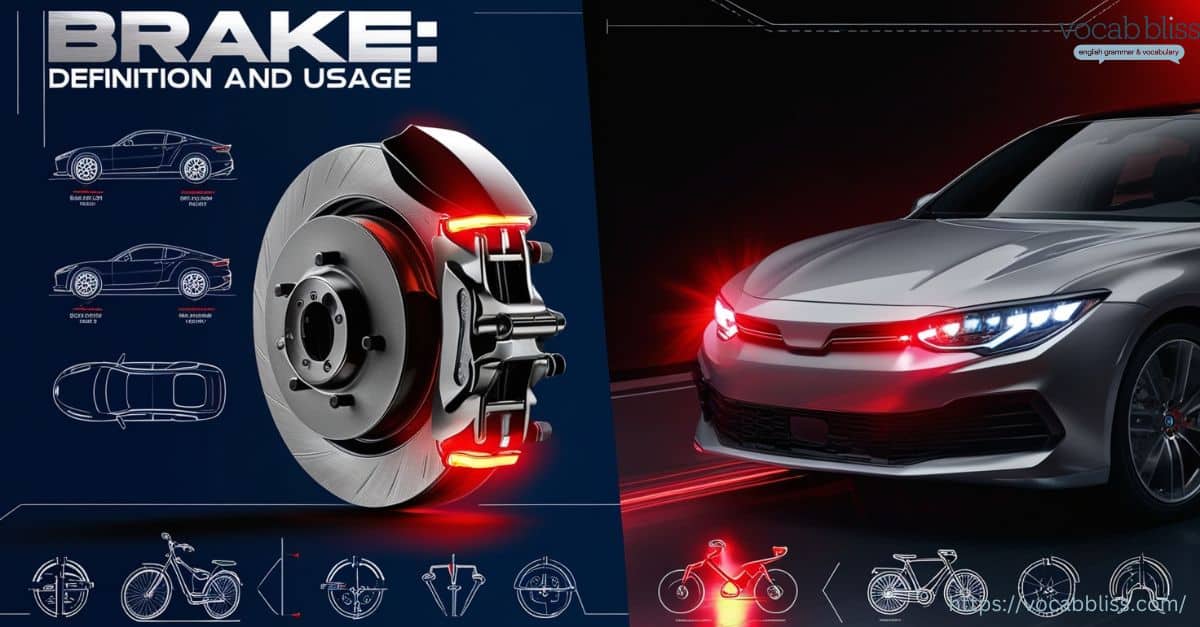
The word “brake” primarily refers to a device used to slow or stop motion, especially in vehicles and machinery. It can also be used metaphorically to describe slowing down or pausing a process or action.
Technical Definition of Brake
As a noun, “brake” is a mechanical device that reduces the speed or halts the movement of a vehicle or machine.
For example, it can be found in cars, bicycles, and trains. In addition, brakes are essential for safety, allowing vehicles to stop when necessary. To illustrate, pressing the brake pedal in a car slows it down, preventing accidents.
- The car’s brake system needs regular maintenance to ensure safety.
- The cyclist applied the brake to avoid hitting the pedestrian.
As a verb, “brake” refers to the act of slowing or stopping movement by using such a device. For instance:
- She braked suddenly when the deer crossed the road.
Metaphorical Usage of Brake
Metaphorically, “brake” can describe slowing or stopping progress in non-physical contexts:
- The manager decided to put the brakes on the project until the budget is approved.
- Stress can act as a brake on productivity.
Which One Is the Brake?
To identify “brake” in writing or speech, consider whether the context involves slowing or stopping motion. This word is often used in scenarios related to vehicles, machinery, or metaphorical pauses in action.
Quick Tip to Identify Brake
If the situation involves a car, bike, or metaphorical “slowing down,” “brake” is the word to use. For example:
- Press the brake pedal to stop the car.
- The CEO hit the brakes on the merger to avoid potential risks.
In contrast to “break,” which involves interruption or damage, “brake” focuses on controlled slowing or stopping.
How Do You Use the Word Brake in a Sentence?
Here are some examples to help you use “brake” correctly:
Vehicle and Machinery Contexts
- The car’s brakes failed, causing a minor collision.
- He braked carefully to avoid skidding on the icy road.
- The bicycle’s front brake is more effective than the rear one.
Metaphorical Contexts
- She decided to hit the brakes on her spending to save for a vacation.
- The team braked their efforts until they received clearer instructions.
Common Phrases with Brake
- Pump the brakes: To slow down or proceed with caution.
- Let’s pump the brakes on launching this product until we’ve done more testing.
- Put the brakes on: To halt or slow a process.
- The government put the brakes on new regulations due to public outcry.
Side-by-Side Comparison
Brake vs Break at a Glance
The table below highlights the key differences between “Brake vs Break”, making it easier to distinguish and use them correctly.
| Aspect | Brake | Break |
|---|---|---|
| Definition | A device or action used to slow or stop motion. | To separate, interrupt, or damage something; also refers to a pause or rest. |
| Part of Speech | Noun (the device) or verb (the action of slowing/stopping). | Noun (a pause or interruption) or verb (the act of damaging, separating, or stopping). |
| Common Uses | – Slowing or stopping vehicles or machines. | – Damaging objects (He broke the glass).- Taking a pause (Let’s take a break). |
| – Metaphorically slowing progress (Put the brakes on the plan). | – Interrupting continuity (The silence broke). | |
| Past Tense | Braked (She braked the car suddenly). | Broke (He broke the vase yesterday). |
| Past Participle | Braked (The vehicle was braked to avoid an accident). | Broken (The glass was broken by the impact). |
| Homophone Confusion | Often confused with “break” due to pronunciation. | Often confused with “brake” when referring to vehicles or slowing motion. |
| Examples in Sentences | – Press the brake to stop the car.– He braked quickly to avoid the cyclist. | – She broke her promise.– Let’s take a lunch break. |
Quick Tips for Remembering
- Brake deals with motion or slowing down, especially in vehicles or machinery.
- Think of the “A” in brake as standing for automobile or action to stop.
- Break is broader, relating to interruptions, damage, or pauses.
- Remember the “E” in break as part of separate or rest.
Everyday Usage Examples break and brake
Understanding how “Brake vs Break” are used in real-life scenarios can help clarify their meanings and contexts. Here are some examples to guide you:
Everyday Scenarios for Brake
Vehicle and Machinery Contexts:
- She pressed the brake pedal to avoid hitting the car in front.
- The bike’s brakes squealed as he stopped abruptly at the traffic light.
- The mechanic inspected the brake system during the vehicle’s maintenance.
Metaphorical Usage:
- We need to hit the brakes on this project until the budget is approved.
- Stress is acting as a brake on her productivity at work.
Common Phrases:
- Pump the brakes: Slow down or proceed with caution.
- Example: Let’s pump the brakes on our spending this month.
- Put the brakes on: Halt or stop something.
- Example: They put the brakes on hiring new employees due to financial concerns.

Everyday Scenarios for Break
Physical Damage or Separation:
- He accidentally broke the vase while cleaning the shelf.
- The rope broke under the weight of the heavy load.
Taking a Rest or Pause:
- Let’s take a quick lunch break before continuing the meeting.
- The students eagerly waited for their break between classes.
Exceeding Limits or Interrupting Continuity:
- The sprinter broke the world record in the 100-meter dash.
- The silence in the room was broken by a sudden laugh.
Common Phrases:
- Break the ice: Start a conversation in a social setting.
- Example: He told a funny joke to break the ice at the party.
- Break a habit: Stop doing something habitual.
- Example: She’s trying to break the habit of staying up too late.
- Break the bank: Spend a lot of money or go over budget.
- Example: Buying this gadget won’t break the bank.
Brake vs Break in a Nutshell
The words “Brake vs Break” are homophones—words that sound alike but have different meanings and spellings. Understanding their distinctions is crucial for correct usage.
Key Differences break vs Brake
| Aspect | Brake | Break |
|---|---|---|
| Definition | A device or action used to slow or stop motion, often in vehicles or machinery. | To separate, damage, interrupt, or take a pause. |
| Common Contexts | Vehicle safety, slowing movement, or metaphorical pauses (hit the brakes on progress). | Physical damage, interruptions, or taking rest (break a glass, lunch break). |
| Verb Forms | Braked (He braked at the stoplight). | Broke (She broke her phone yesterday). |
| Past Participle | Braked (The car was braked to avoid impact). | Broken (The vase was broken during the move). |
Easy Ways to Remember break vs Brake
- Think Vehicles for “Brake”:
- If it involves stopping motion or slowing down, it’s “brake”.
- Example: The bike’s brakes failed on the steep hill.
- Think Interruptions for “Break”:
- If it involves damage, separation, or a pause, it’s “break”.
- Example: Let’s take a lunch break after this meeting.
- Mnemonic Device:
- “Brake” has an “A,” like in “auto” or “action to stop.”
- “Break” has an “E,” like in “separate” or “rest.”
Brakes vs Breaks
When written as plurals, brakes vs breaks can cause additional confusion:
- Brakes: Devices that stop or slow down motion (e.g., car brakes).
- Breaks: Pauses or interruptions (e.g., coffee breaks).
For example:
- The car’s brakes failed, causing an accident.
- I usually take short breaks during long study sessions.
Breaking vs Braking
The present participles breaking vs braking highlight the ongoing actions of their respective roots:
- Breaking: Refers to shattering or interrupting something (e.g., “She is breaking the vase.”)
- Braking: Refers to slowing down or stopping motion (e.g., “He is braking to avoid hitting the dog.”)
Fill in the Gaps to Check Yourself
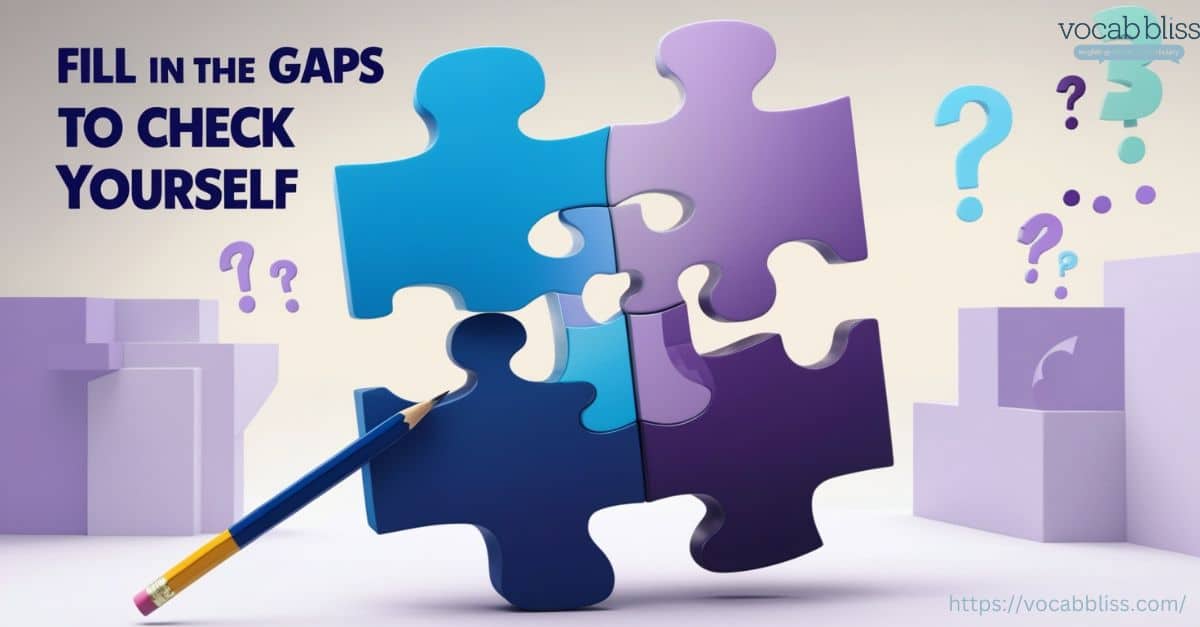
Let’s test your understanding! Fill in the blanks with break vs Brake:
- The cyclist hit the ______ to avoid a collision.
- Let’s take a short ______ before resuming the meeting.
- She accidentally ______ her favorite mug.
- The mechanic repaired the faulty ______ system.
- He is ______ to prevent a speeding ticket.
Answers:
- brake
- break
- broke
- brake
- braking
Conclusion
Mastering the difference between Brake vs Break comes down to understanding their meanings and contexts. Whether you’re referring to a vehicle’s brakes or a much-needed break time, this guide has you covered. Practice makes perfect, so revisit these examples and exercises whenever you need a refresher. With these insights, you’ll never confuse brakes vs breaks again!
FAQs About break vs Brake
- Do You Take a Brake or Break?
You take a break when you need rest. A brake is what you use to stop your car.
- Is It Break or Brake at Work?
At work, you take a break, not a brake.
- Is It Break Time or Brake Time?
It’s break time when pausing from work.
- Is It Break or Brake for a Bone?
When a bone is damaged, it is broken (related to “break”).
- Is It Brake or Break a Leg?
The phrase is break a leg, a way to wish someone good luck.

